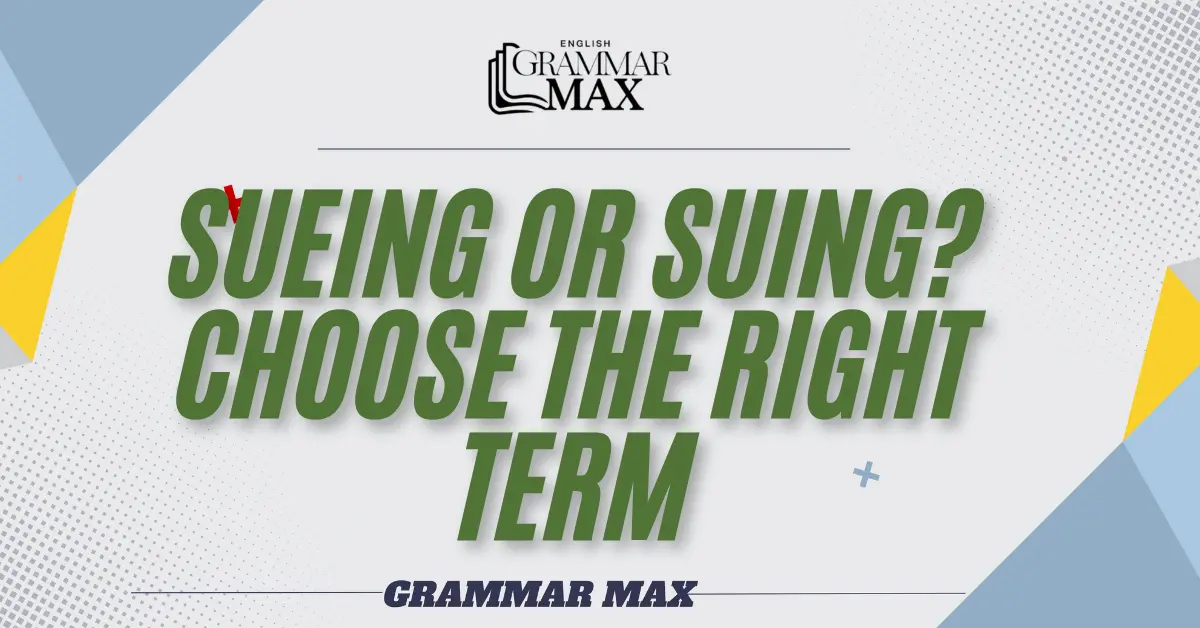One of the most common spelling mistakes in legal terminology is confusing “sueing” with “suing.” Both words might look right at first glance, but only one is the correct way to describe the legal action of taking someone to court. This small spelling difference can create a significant misunderstanding, especially in professional settings where precision in terminology is critical.
Throughout this article, we will explain why “suing” is correct and why using “sueing” can lead to a lack of clarity and professionalism in legal communication. Let’s look at each term in detail to help you avoid incorrect usage and choose the right terminology.
Understanding Sueing and Suing
The terms “sueing” and “suing” stem from the verb “sue,” which means to file a lawsuit against someone. While both appear similar, only “suing” is correct in standard English. Adding “-ing” to most verbs requires removing the last “e.” For example, “drive” becomes “driving” by dropping the final “e,” and the same rule applies to “sue.” Therefore, the accurate spelling is “suing.”
The incorrect spelling “sueing” doesn’t follow these standard English rules. Many people make this error, possibly because they expect to keep the “e” for a phonetically accurate sound. However, in formal and legal documents, “sueing” is simply a common misspelling and should be avoided.
Sueing: Definition and Usage
While “sueing” might look reasonable, it’s a misunderstanding of English grammar and spelling rules. In simple terms, “sueing” is an incorrect way to represent the action of taking someone to court. This form might appear in informal or casual contexts, particularly on social media or in online forums, where spelling conventions are less strictly followed. Unfortunately, using “sueing” instead of “suing” can make writing appear unprofessional and undermine the writer’s authority. While readers may understand the intended meaning, this common misspelling can cause confusion, especially among those less familiar with legal terms.
Suing: Definition and Usage
“Suing” is the correct form and is used to indicate that someone is involved in litigation or legal proceedings. As an established legal term, it accurately describes the process of filing a claim against another party in a court of law. Legal professionals understand “suing” as the formal way to initiate a lawsuit or pursue justice in the courtroom.
This correct spelling follows English grammar rules by dropping the “e” when adding “-ing” to “sue.” For example: “She is suing the company for damages” is a proper, grammatically correct sentence.
In legal and professional contexts, accuracy in terminology like “suing” is vital. Lawyers and other legal advisors rely on this accurate term to communicate effectively in both written and spoken language. Mistakes like “sueing” not only reduce clarity but also reflect a lack of precision, which can be costly in a legal setting.
Side-by-Side Comparison
| Term | Definition | Correct/Incorrect | Example Sentence |
| Sueing | Incorrect spelling, non-standard form of “suing” | ❌ Incorrect | “He is sueing the company.” |
| Suing | Correct spelling, proper form used in legal contexts | ✅ Correct | “He is suing the company for damages.” |
This table highlights the distinction between “sueing” and “suing,” with “suing” being the proper and grammatically accurate choice. The side-by-side view helps clarify why legal professionals only recognize “suing” as the right term.
Why Does It Matter?
The importance of correct spelling in legal terms cannot be overstated. In a courtroom or during legal proceedings, accuracy is essential. Using the wrong word or terminology can lead to misunderstanding and potentially harm your credibility.
When people see “sueing” in a formal document, it may seem like a minor mistake, but it reflects a lack of professionalism and accuracy in legal knowledge.
In the world of law, where every word counts, precision is paramount. Using “suing” instead of “sueing” is not only correct but also demonstrates respect for the legal process and the attention to detail expected in this field.
For those drafting legal documents or discussing lawsuits, maintaining the correct spelling strengthens their message and shows their understanding of the legal terminology in play.
Synonyms for Suing (Correct Term)
- Litigating
- Taking legal action
- Filing a lawsuit
- Prosecuting
- Seeking redress
- Bringing a case against
- Taking to court
- Pursuing a claim
- Bringing legal action
Synonyms for Sueing (Incorrect Term)
Since “sueing” is a common misspelling of “suing,” it doesn’t have its own synonyms. However, it could be replaced by any of the synonyms above, as these correctly refer to the legal action involved in “suing.”
Using these terms accurately helps to maintain clarity in legal language and avoids the potential misunderstanding that may come with incorrect spellings.
Everyday Usage Examples
Here are some examples showing how “suing” is correctly used in various contexts:
- “After the incident, the family is suing the company for negligence.”
- “He is considering suing for damages after the contract breach.”
- “The patient’s family is suing the hospital for malpractice.”
In everyday language, “suing” reflects a legal action where one party takes legal steps against another in court. The incorrect usage “sueing” could cause confusion and lead to a loss of credibility, especially in cases where the legal terminology is critical for understanding.
Frequently Asked Questions
Is “Sueing” Ever Correct?
No, “sueing” is not a correct spelling in standard English. It does not follow English grammar rules and should be avoided in professional and legal contexts.
Why Is “Suing” the Correct Form?
“Suing” is the accurate and proper form that follows the rule of dropping the “e” before adding “-ing.” This is the standard for most English verbs.
How Can I Remember the Correct Form?
A helpful tip is to remember that “sueing” is a common misspelling. Think of “drive” and “driving” as a similar example where the “e” is dropped before adding “-ing.”
Conclusion
In conclusion, “suing” is the only correct term when discussing litigation or taking someone to court. Choosing the right terminology avoids confusion and maintains professionalism in legal writing and conversation. Inaccurate spelling like “sueing” can reduce credibility and lead to personal and professional misunderstandings.
Accuracy is essential in law, and using “suing” reflects a clear understanding of legal terms and proper spelling conventions.

William Henry is a writer for Grammar Max, a blog that focuses on synonyms and phrases. He loves exploring the quirks of the English language and enjoys helping readers improve their vocabulary. William’s articles are easy to read, fun, and full of useful tips for anyone looking to better understand and use English. Whether you’re a student, a professional, or just someone interested in language, William’s writing on Grammar Max makes learning about words and their meanings simple and enjoyable.





